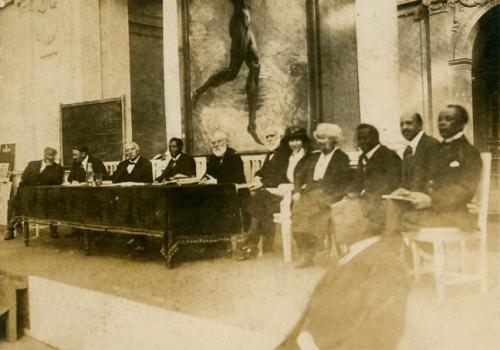The Pan African Congresses
Pan-Africanist ideals emerged in the late nineteenth century in response to European colonization and exploitation of the African continent and the decline of the Colored Conventions Movement (1830-1887). Pan-Africanist philosophy held that slavery and colonialism depended on and encouraged negative, unfounded categorizations of the race, culture, and values of African people. These destructive beliefs in turn gave birth to intensified forms of racism, the likes of which Pan-Africanism sought to eliminate through Pan-African Congresses.
The Pan-African Congress – following on from the first Pan-African Conference of 1900 in London – was a series of seven meetings, held in 1919 in Paris (1st Pan-African Congress), 1921 in London (2nd Pan-African Congress), 1923 in London (3rd Pan-African Congress), 1927 New York City (4th Pan-African Congress), 1945 Manchester(5th Pan-African Congress), 1974 Dar es Salaam (6th Pan-African Congress), 1994 Kampala (7th Pan-African Congress), and the 8th Pan African Congress in 2014 in Accra that were intended to address the issues facing Africa as a result of colonization of most of the continent.
Planning for the 9th Pan African Congress will be held December 27th -29th 2016 in Cincinnati Ohio at The Public Library of Cincinnati and Hamilton County Huenefeld Tower Room and other spaces as needed at 800 Vine St, Cincinnati, OH 45202.
Possible Theme for the 9th Pan African Congress – Economic Development that births a Nation.
Tracks include for the development of a plan for a federated unified African state that involves a real surrender of sovereignty; it would be an irreversible structure that would grow out of today’s structures and plans to include the whole of the people of the African Union (today 1.5B people, including 47M in the USA).
September 2017 as the conference date in Washington DC.
 The First Pan-African Conference was held in London from 23 to 25 July 1900 (just prior to the Paris Exhibition of 1900 “in order to allow tourists of African descent to attend both events”). Organized primarily by the Trinidadian barrister Henry Sylvester-Williams. In 1897, Henry Sylvester-Williams, a West Indian Barrister, formed the African Association in London, England to encourage Pan-African unity; especially throughout the British colonies. Sylvester-Williams, who had links with West African dignitaries, believed that Africans and those of African descent living in the Diaspora needed a forum to address their common problems. This first Congressional Event took place in Westminster Hall and was attended by 37 delegates and about 10 other participants and observers from Africa, the West Indies, the US and the UK, including Samuel Coleridge Taylor (the youngest delegate), John Alcindor, Dadabhai Naoroji, John Archer, Henry Francis Downing, and W. E. B. Du Bois, with Bishop Alexander Walters of the AME Zion Church taking the chair, Du Bois played a leading role, drafting a letter (“Address to the Nations of the World”) to European leaders appealing to them to struggle against racism, to grant colonies in Africa and the West Indies the right to self-government and demanding political and other rights for African Americans.
The First Pan-African Conference was held in London from 23 to 25 July 1900 (just prior to the Paris Exhibition of 1900 “in order to allow tourists of African descent to attend both events”). Organized primarily by the Trinidadian barrister Henry Sylvester-Williams. In 1897, Henry Sylvester-Williams, a West Indian Barrister, formed the African Association in London, England to encourage Pan-African unity; especially throughout the British colonies. Sylvester-Williams, who had links with West African dignitaries, believed that Africans and those of African descent living in the Diaspora needed a forum to address their common problems. This first Congressional Event took place in Westminster Hall and was attended by 37 delegates and about 10 other participants and observers from Africa, the West Indies, the US and the UK, including Samuel Coleridge Taylor (the youngest delegate), John Alcindor, Dadabhai Naoroji, John Archer, Henry Francis Downing, and W. E. B. Du Bois, with Bishop Alexander Walters of the AME Zion Church taking the chair, Du Bois played a leading role, drafting a letter (“Address to the Nations of the World”) to European leaders appealing to them to struggle against racism, to grant colonies in Africa and the West Indies the right to self-government and demanding political and other rights for African Americans.
Conference participants read papers on a variety of topics, including the social, political, and economic conditions of blacks in the Diaspora; the importance of independent nations governed by people of African descent, such as Ethiopia, Haiti, and Liberia; the legacy of slavery and European imperialism; the role of Africa in world history; and the impact of Christianity on the African continent. Perhaps of even greater significance was the formation of two committees. One group, chaired by DuBois, drafted an address “To the Nations of the World,” demanding moderate reforms for colonial Africa.
